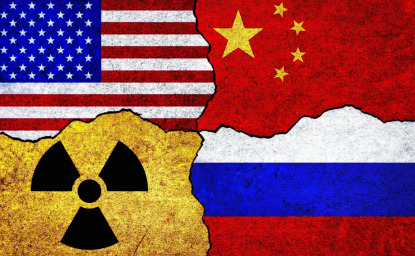Why Russia and America Need Each Other

"The main message I have today is that we need to awaken to the importance of the relationship between Russia and the United States; we should not leave it on auto-pilot indefinitely," said Dmitri Trenin, senior associate and deputy director, Carnegie Moscow Center, at a 2 February 2007 seminar at the Kennan Institute. Trenin recounted the current problems in the relationship, arguing that both sides have unrealistic expectations of one another. In his view, the U.S.-Russian relationship is of crucial importance, and he described ways in which relations could be improved.
"At the beginning of this year, the talk in both capitals is rather downbeat," Trenin said, adding, "I think people agree more or less that we have never had a relationship that was at such a low level as today since 1991." Trenin said that this is true in spite of what he sees as a great deal of shared interests between the two countries.
According to Trenin, the deterioration of U.S.-Russian relations is viewed in starkly different terms in Washington and in Moscow. "If you put your ear to the ground in Washington, it's all because of Putin's authoritarianism at home, and increasing assertiveness abroad," Trenin said. He added that Washington views Russia's increased strength as a direct result of its large exports of oil and natural gas, and for this reason Russia's resurgence is seen as both undeserved and fragile.
"If you listen in Moscow, you get a very different story," Trenin observed. Prevailing opinion in Moscow regards the heightened tension between the United States and Russia as a natural consequence of Russia's increased strength. Russia's leadership believes that tensions inevitably arise when one power gains strength rapidly while another country's power diminishes, Trenin stated.
Both of these views are wrong, Trenin believes. "Despite what some people in Russia hope, the United States is not a declining power, Iraq notwithstanding," he stated. "As the world's most important nation, it will be around for a long time." On the other hand, he continued, Russia is more important than most Americans realize. "Despite what a number of people in the U.S. have concluded, Russia is not so much in decline; it is rather in the process of reformatting itself, emerging as a totally different economy and a totally different society than the Soviet one," Trenin said.
The steady deterioration of relations is threatening to jeopardize future Russian-American partnership and cooperation, Trenin warned: "The U.S. and Russia may be straying into the territory of direct material damage to their existing interests." He noted that this situation is not likely to change until the respective American and Russian presidential elections in 2008. Both of the new presidents will probably be untested statesmen, and thus an opportunity for reinventing the relationship will arise.
In spite of these disagreements, Trenin emphasized that Russia and the United States need one another and that cooperation between the two countries is essential. On a wide range of issues, U.S. and Russian interests coincide, including non-proliferation of weapons of mass destruction, managing the rise of China, dealing with the difficult situation in the Middle East, and resolving "frozen conflicts." In addition, Russia needs American assistance to modernize and integrate its economy into the global market, and to gain access to American markets, he said. The United States needs Russia's cooperation in the fight against terrorism, he said. Positive relations between the two countries would lead to a more stable world, and would enhance both countries' security.
In connection with this, Trenin believes that a new global institution needs to be formed to maintain stability and security. This organization would be similar to the G-8, in that it would provide a forum for the discussion of major problems confronting the world, he said, but would be more inclusive than the G-8, because it would not require a country to be "democratic." The group could include all the G-8 members, as well as China, India, and Brazil. Russia wants to be given a seat at the table where decisions are made, Trenin stressed, and such an organization could be one way to accomplish this goal.
Another way to improve relations is through economic cooperation, he said. "For 200 years, the hallmark of the U.S.-Russian relationship was its government-to-government nature," Trenin observed, adding that this remains true today. In the absence of improved political ties between the governments, however, the business communities in each country could provide an avenue for improving relations. Although business and social ties between the countries have never been close, unprecedented opportunities for forging stronger economic ties exist today. "Russia today, like at no other point in its history, is powered by private moneyed interests," he noted.
Trenin said that Russia was not a democracy, and that it would not be one for several decades; instead, it is a country of developing capitalism. "For the foreseeable future, we will have to deal with a country where the supreme values are quoted in dollars, and euros, and rubles. There is another country waiting on the shelves of libraries, and elsewhere. But we are dealing with the realities of today," he concluded.
Author

Kennan Institute
After more than 50 years as a vital part of the Wilson Center legacy, the Kennan Institute has become an independent think tank. You can find the current website for the Kennan Institute at kennaninstitute.org. Please look for future announcements about partnership activities between the Wilson Center and the Kennan Institute at Wilson Center Press Room. The Wilson Center is proud of its historic connection to the Kennan Institute and looks forward to supporting its activities as an independent center of knowledge. The Kennan Institute is committed to improving American understanding of Russia, Ukraine, Central Asia, the South Caucasus, and the surrounding region through research and exchange. Read more

Explore More
Browse Insights & Analysis
US Inaction Is Ceding the Global Nuclear Market to China and Russia

360° View of How Southeast Asia Can Attract More FDI in Chips and AI

